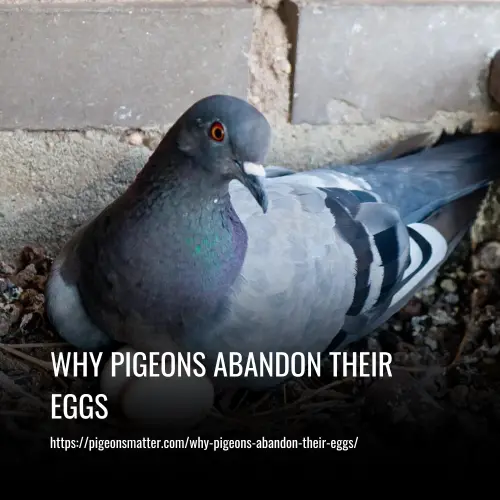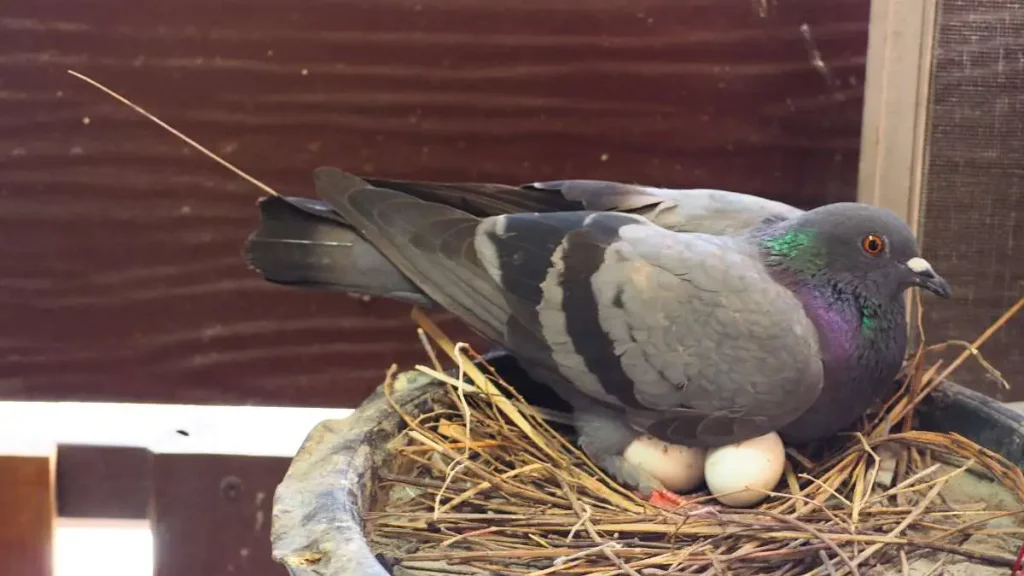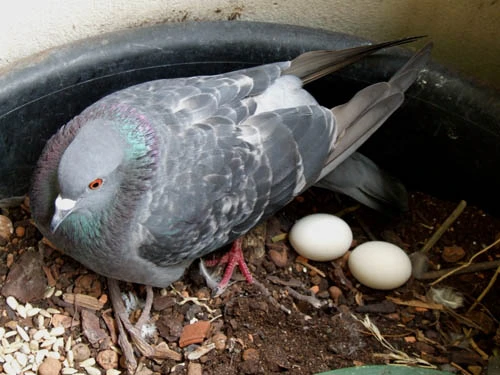Why Pigeons Abandon their Eggs
This post contains affiliate links. As an Amazon Associate, we earn from qualifying purchases.
Pigeons are known for being resilient birds that can adapt to various environments. However, it’s not uncommon for them to abandon their eggs, leaving many to wonder why. Understanding the reasons behind this behavior can provide insight into pigeon behavior and help find solutions to reduce the occurrence of egg abandonment.
Possible Reasons for Pigeon Egg Abandonment:
- 1. Infertile Eggs
- 2. Loss of a Mate
- 3. Waiting for the Second Egg
- 4. Sense of Unhealthy Eggs
- 5. Predation Risk
- 6. Temperature Extremes
- 7. Inadequate Incubation
- 8. Human Interference
- 9. Nest Destruction
- 10. Food Scarcity
- 11. Disease and Parasites
- 12. Inadequate Resources

Reasons Why Pigeons Abandon Their Eggs
Understanding why pigeons may abandon their eggs is essential for pigeon owners to ensure successful hatching and rearing. Here are some possible reasons for egg abandonment:
1. Infertile Eggs
Pigeons may eventually abandon infertile eggs as they realize their efforts are in vain. It’s crucial to ensure the pair of pigeons is viable for breeding before expecting successful incubation.
2. Loss of a Mate
Pigeons usually share the incubation duties, with the male searching for food in the morning and the female in the afternoon. If a female loses her mate or a male loses his partner, they may abandon the clutch due to hunger or the absence of their partner.
3. Waiting for the Second Egg
Female pigeons typically lay two eggs, with the second egg appearing a day or two after the first. It is normal for the female not to start incubation until the second egg is laid, which may give the impression that the first egg has been abandoned.
4. Sense of Unhealthy Eggs
Pigeon mothers have an innate ability to sense if their eggs are not healthy and won’t hatch. They won’t attempt to incubate eggs that are unlikely to result in viable offspring. Healthy eggs have smooth, shiny shells with visible veins when examined with a flashlight.
5. Predation Risk
Pigeons may sense an increased threat from predators and abandon their eggs to prioritize their safety. It’s important to provide a safe and secure nesting environment to minimize predation risk.
6. Temperature Extremes
Extreme temperature fluctuations can negatively impact the viability of eggs. Ensuring that the nesting area has suitable temperature control can help prevent pigeons from abandoning their eggs.

7. Inadequate Incubation
Inexperienced pigeons may struggle with proper incubation behaviors, which can lead to the abandonment of eggs. Providing guidance or support to inexperienced pigeons can help improve their incubation abilities.
8. Human Interference
Human disturbances, such as loud noises or construction, can be perceived as threats by pigeons. Minimizing human interference near the nesting area can reduce the likelihood of pigeons abandoning their eggs.
9. Nest Destruction
Accidental or intentional destruction of a pigeon’s nest can result in the abandonment of eggs. Taking precautions to avoid nest destruction during any maintenance or construction activities is important.
10. Food Scarcity
Sudden scarcity of food can prompt pigeons to prioritize survival and abandon their eggs. Ensuring a consistent food source is available can help prevent pigeons from abandoning their eggs due to food scarcity.
11. Disease and Parasites
Pigeons can be susceptible to avian diseases and mite infestations, which can affect their ability to reproduce. Monitoring the health of pigeons and providing appropriate treatment can help prevent them from abandoning their eggs.
12. Inadequate Resources
Pigeons require suitable nesting materials to construct their nests. Ensuring these materials are readily available can prevent pigeons from abandoning their eggs due to a lack of proper nesting environment.
By understanding and addressing these factors, you can help promote successful incubation and breeding among pigeons.
Is It Safe for Pigeons to Abandon Their Eggs
Yes, it is safe for pigeons to abandon their eggs in certain circumstances. The most common reason for abandonment is if the eggs are infertile, in which case it is best to leave them alone. If the eggs become rotten, abandonment also poses no threat.
However, if the eggs are in danger due to a lack of food resources or threats in the surroundings, it may be necessary to intervene and take care of them.
How Do Pigeons Determine Which Eggs to Hatch And Which to Abandon
Pigeons determine which eggs to hatch and which to abandon based on a few factors. They are more likely to abandon infertile or unhatchable eggs, as well as eggs that have become dirty or unstable due to unfavorable conditions in the nest. If a pigeon is in poor health or injured, it may also abandon its eggs because it lacks the energy or ability to care for them.
Additionally, pigeons may abandon eggs to conserve resources, such as food and energy, if the environment is harsh or they cannot find sufficient help. The decision to abandon eggs is a complex process influenced by various factors.
Is Abandoning Eggs A Problem
Abandoning eggs can be a problem, especially if it happens regularly. It is important to investigate the reason behind the abandonment. Check the health of the eggs and look for any safety issues, such as high traffic areas or the presence of a pet that scares the birds away. If the eggs are rotten, there is nothing that can be done. For pet pigeons, safety is not usually an issue.
However, if a pair of pigeons consistently abandons their eggs, it may be necessary to increase the safety of their nest or consider changing their partners. Ultimately, it is possible that the pigeons simply do not want to have babies and are not interested in being parents.

What to Do with Unhatched Pigeon Eggs
When encountering unhatched pigeon eggs, there are several options to consider based on your circumstances and intentions:
1. Observe and Wait
If the eggs appear undamaged and intact, you can give them more time to hatch naturally. Variation in incubation conditions or other factors may cause a delay. Maintain a safe distance and minimize disturbances to the nest.
2. Consult Experts
If you’re unsure about the status of the eggs or how to proceed, it’s recommended to seek guidance from local wildlife experts, ornithologists, or avian rehabilitation centers. Their expertise and knowledge of local bird species can provide valuable insights.
3. Create a Safe Environment
If it appears that adult pigeons have abandoned the eggs, you can consider providing a safe and warm environment for them. Use a small container lined with soft bedding material and place it in a warm, quiet, and secure location. However, note that raising baby pigeons requires specialized care, so consult experts if you plan to take on this responsibility.
4. Practice Caution
If you decide to handle the eggs, handle them gently to avoid damaging the delicate embryos inside. Avoid rotating or shaking the eggs, as mishandling can harm the developing chicks.
5. Disposal
If the eggs are damaged, cracked, or have been exposed for a prolonged period, they are likely no longer viable. In such cases, you can carefully dispose of the eggs by burying them or placing them in a compost bin.
6. Educational Opportunities
Unhatched pigeon eggs can serve as excellent educational tools for educators or those interested in science education. They can be utilized to teach students about bird reproduction, embryonic development, and the importance of wildlife conservation.
How Long Can a Pigeon Leave Its Eggs
Pigeons should not leave their eggs unattended as the eggs require proper incubation for the fetus inside to develop into a baby chick. However, in rare cases when a pigeon does leave its eggs, the eggs can survive for up to five to seven days without incubation.
After this time, the chicks inside will die. If you come across an abandoned pigeon egg, the best thing to do is to incubate it yourself. You can easily find a suitable heat incubator online. By taking care of the egg, you will have the opportunity to raise a cute baby bird.
FAQs
If your pigeon pair keeps abandoning their eggs, you should investigate the nest and cage to determine the cause. Check the weather conditions, as thunderstorms or heavy rain can destroy nests and push the eggs away, especially if the cage isn’t properly covered. Ensure that your pigeon cage is covered properly, especially in the winter, while still providing fresh air, sunlight, and water. If everything is fine with the conditions, consider pairing up the pigeons with other pigeons for breeding purposes. This can be a successful solution, as observed by experienced pigeon breeders.
If you come across an abandoned pigeon egg, there are a few things you can do depending on the situation. If the eggs are infertile or dead, it’s best to leave them be as the pigeon knows what it’s doing. However, if you find a lone egg or a group of eggs away from their nest, you can carefully pick them up and place them back in the nest. If you want to hatch pigeon eggs on your own, you can use an incubator. However, keep in mind that raising a pigeon from birth to adulthood is a challenging task and they may be weaker if raised by humans instead of in a natural environment.
To determine if there is a live pigeon chick in an egg, there are a few methods you can try. First, you can tap the egg lightly and listen for any movement or chirping sounds. If the egg is close to hatching, you may feel or hear movement inside. Another method is called candling. Take the egg into a dark room and hold it in front of a bright light. If you see veins or the silhouette of a baby pigeon inside, then the egg is alive. If you see nothing, it’s likely a dead egg and hatching will not occur.
No, pigeons do not eat their eggs. They are actually very protective of their eggs and will do everything they can to keep them safe. If you find a broken egg in a pigeon’s nest, it’s likely that the mother bird thought it was damaged or infertile.
Pigeons break their eggs for a couple of reasons. One reason is if they sense that a human has touched the egg, they may break it to protect it from potential harm. Additionally, pigeons may break their eggs if they believe the egg is dead, damaged, or infertile. This instinctual behavior helps them ensure the survival of their offspring.
To determine whether a pigeon egg is fertile, you need to wait for about 18 days, which is the average incubation period for pigeon eggs. During this time, the egg should be kept at a constant temperature of around 82 degrees Fahrenheit. This can be achieved by using an incubator or simply keeping the egg in a warm room. After the 18-day period, if you carefully examine the egg, you should be able to see a small chick developing inside. If there is no sign of a chick, then it means that the egg is not fertile.
There are several reasons why a mother pigeon may not sit on her eggs. One reason is that the temperature inside the nest is too hot, so she leaves the eggs to cool them down and prevent defects or rot. Another reason is that the male pigeon is not present to take over sitting duties. If the female pigeon is not feeling well, she may also leave the eggs to rest. Finally, if the female pigeon is not getting enough food, she may leave the eggs to search for food and regain energy.
Pigeon eggs typically take around 18 days to hatch. Pigeons are monogamous birds and lay eggs all year round, usually raising more than one offspring in a season. The hatching time can vary depending on the mating behavior and the climate conditions. Pigeons are commonly found in urban areas, making it easy to spot their eggs and nests.
Yes, pigeons need to sit on their eggs all the time to keep them warm. The eggs require constant warmth from the pigeon in order for them to hatch and for the chicks inside to survive. The male pigeon will also take turns sitting on the eggs to give the female a break. However, the only time a pigeon may not be sitting on an egg is if it is laying its remaining eggs and waiting for them to hatch at the same time.
No, pigeons will not give up their eggs if you touch them. This is just a myth. Pigeons do not have a good sense of smell, so they will not be able to detect that the egg has been touched. It is safe to touch a pigeon egg, and both the mother pigeon and the egg itself will not harm you.
Pigeon eggs can survive for about 5-7 days without heat at normal temperatures. If the temperature is too hot, incubation may start on its own. It is possible to chill pigeon eggs in the freezer for a few days. However, keep in mind that pigeon eggs cannot survive as long as chicken eggs and their fertility decreases over time. It is not recommended to put pigeon eggs in the refrigerator if you want to hatch them.
In some cases, pigeons may return to their abandoned eggs if the stress factors have been removed and the eggs are still viable. However, this is not always guaranteed.
To prevent pigeons from abandoning their eggs, provide a quiet and safe nesting environment, minimize disturbances, and avoid handling the nest or eggs.
Recognizing signs of pigeon egg abandonment is important for timely intervention. If you see a nest that is being neglected, eggs left unattended for a long time, or a lack of parental attention, it may be a sign of abandonment. Taking action early can involve creating a safe nesting environment, addressing threats, or working with wildlife conservation efforts. These proactive measures help protect pigeon populations and promote coexistence.
Conclusion
In conclusion, the reasons behind why pigeons abandon their eggs are multifaceted and complex. Factors such as environmental stressors, disturbances to their nesting sites, and even human interference can all contribute to the abandonment of pigeon eggs. Additionally, issues such as disease, predation, and inadequate food resources can also play a role in this behavior.
Understanding the reasons for pigeon egg abandonment is crucial for developing effective conservation and management strategies. By addressing the root causes of this behavior, we can work to mitigate its occurrence and ultimately support the well-being of pigeon populations.